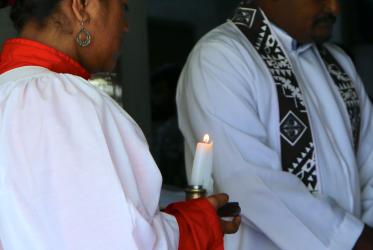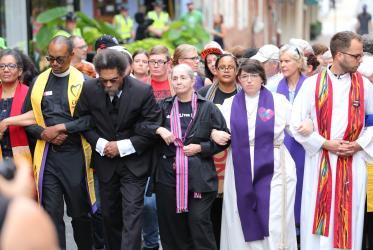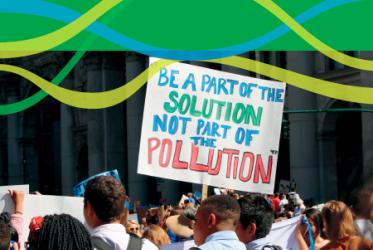Evolution of institutional mandates and related views/concepts of development
13-14 February 2003, Geneva, Switzerland
AGREEMENTS AND MAIN POINTS
FOR FOLLOW-UP AND ACTION
Background
1. Building on the joint planning meeting held in May 2002, the World Council of Churches (WCC), World Bank (WB) and International Monetary Fund (IMF) jointly conducted the first of a proposed series of seminars on development issues last 13 to 14 February 2003 at the Ecumenical Center in Geneva, Switzerland. All together, there were 30 participants and observers from the WCC, WB and IMF (see attached attendance list).
2. The seminar was organized around four themes. Session 1 focused on the evolution of institutional mandates and views on development. Session 2 explored each participating institution's concept of wealth creation and social justice. To see how views on development play out in the policy arena, session 3 looked at the privatization of public goods such as water. The final session tackled the question "where do we go from here?."
3. The seminar was aimed at: (1) enabling participating institutions to critically look at their mandates and approaches to development; as well as (2) coming up with fundamental questions that may need further debate and resolve in a next seminar.
4. This report summarizes the main agreements and decisions taken during the seminar that require follow-up and action.
Commonalities and differences
5. Through the various presentations from the WCC, WB and IMF and the ensuing plenary/group discussions, the seminar helped to identify areas of commonality as well as issues of difference among the three institutions with respect to the their mandates, development perspectives, concepts of social justice and views on privatization.
6. Overall, the participants reiterated that the WCC, WB and IMF - three international institutions that were established after the second world war and have shaped development philosophy and policy to varying degrees - share the common objective of poverty eradication in a world facing the immense challenges of economic globalization. However, the three institutions have dissimilar operational values and approaches to achieving this objective.
7. In the interest of transparency, a decision was made to publish the papers presented during the seminar which show the different developmental perspectives of the WCC, IMF and WB. This is to encourage feedback not only among the seminar participants, but also from constituencies that have been and continue to be directly affected by the development policies of these three institutions.
8. It was further proposed that the group reports highlighting the commonalities and differences of the three institutions be further sharpened by a smaller planning group in a concise summary of the seminar proceedings. The seminar proceedings will also be published in a dossier.
Issues to be taken forward in a second seminar
9. As a next step, the participants from the WCC, IMF, and WB generally agreed that the process of dialogue between the three institutions should be continued in the form of a second collaborative seminar, notwithstanding continuing differences between the three institutions.
10. As intended, the plenary/group discussions brought to the fore a number of pressing concerns, ranging from the issue of participation to the HIV-AIDS pandemic, that call for joint clarification and analysis from the standpoints of the WCC, IMF and WB in a second seminar.
11. However, it was decided that the second seminar will focus on only four specific issues, as follows:
Issues
- Participation of civil society in development. The issue of people's participation in development policy-making, implementation, monitoring and evaluation will be looked at in terms of roles and processes with emphasis on the external debt problem and the Poverty Reduction Strategy Paper (PRSP) approach of the IMF and WB.
- Institutional governance and accountability. The need for more democratic and representative governance of international institutions and accountability for their development policies and actions will be discussed.
- Respective roles of public and private sectors in development. Here, the roles/responsibilities of and interplay between states and markets in development policy and poverty eradication efforts will be explored. The question of how to deal with governments lacking in legitimacy will also tackled.
- Challenges of globalization. The following questions will be addressed, among others: What are the dynamics of the globalization process? Who are the key actors? What are the impacts in terms of growth and equity?
Planning for the second seminar
12. Venue, dates, participants, style/format and communication procedures for the second seminar were also decided on.
13. Since the WCC had offered their hospitality in hosting the first seminar in Geneva, Switzerland, it was agreed that the IMF and WB will have their turn in hosting the second seminar. The second seminar will be held in the fall of 2003 in Washington DC, USA. The exact dates of the second seminar will be finalized by a smaller planning group.
14. The importance of continuity in terms of participation was stressed in order to build on gains already made during the first seminar. A suggestion was therefore made that the proposed participants to second seminar be generally composed of the participants to the first seminar in Geneva. As with the first seminar, the institutions will pay for the travel and accommodation of their participants.
15. Presentations, plenary and group discussions will continue to be utilized in the second seminar to bring clarity to as well as to deepen analyses of the identified issues for discussion. There was a recommendation to present specific country cases in dealing with the issues. Role-playing was also suggested as a possible activity for the second seminar.
16. Transparency and publicity both internally and externally were again emphasized. To enable better preparation and, therefore, a more informed and meaningful exchange between the WCC, IMF and WB, it was suggested that presentations and papers for the second seminar be shared among speakers and participants before the seminar dates, allowing ample time for reaction.
17. Finally, to keep the process of dialogue between the three institutions alive between seminar and meetings, a reminder was made to share information and reactions to development issues.



